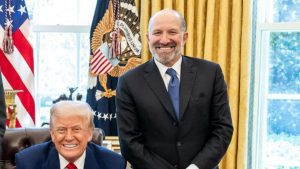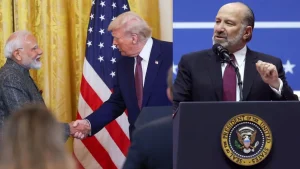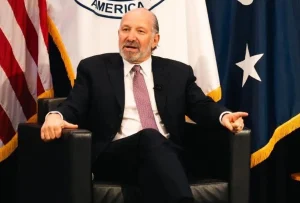Washington D.C. – US Commerce Secretary Howard Lutnick has made a provocative prediction regarding future trade negotiations, stating that US Commerce Secretary Lutnick on India expects New Delhi to return to the negotiating table within months seeking reconciliation. Speaking in a recent interview, Lutnick expressed confidence that India will be compelled to apologize and pursue a trade agreement with the Trump administration.
“I think, yes, in a month or two months… India is going to be at the table, and they’re going to say they’re sorry, and they’re going to try to make a deal with Donald Trump,” Lutnick declared. The Commerce Secretary emphasized that the final decision regarding how to handle Prime Minister Narendra Modi would rest with President Trump himself.
This bold statement from US Commerce Secretary Lutnick on India reflects growing confidence within the Trump administration about America’s leverage in bilateral trade negotiations, particularly given the significant tariffs recently imposed on Indian goods.
America’s Economic Leverage Strategy

The rationale behind US Commerce Secretary Lutnick on India’s confident prediction centers on America’s position as the world’s largest consumer market. Lutnick emphasized that the United States’ $30 trillion economy provides unprecedented leverage in international trade negotiations.
“We are the consumers of the world. People have to remember, it’s our $30 trillion economy that is the consumer of the world. So eventually they all have to come back to the customer, because we all know eventually the customer is always right,” Lutnick explained, highlighting the foundational logic behind his assessment.
The Commerce Secretary’s position suggests that US Commerce Secretary Lutnick on India views economic pressure as the primary tool for compelling New Delhi to reconsider its current trade and geopolitical positions.
Criticism of India’s Geopolitical Positioning


US Commerce Secretary Lutnick on India has been particularly critical of New Delhi’s reluctance to align more closely with American interests. He specifically cited three key areas where India has disappointed Washington: market access, Russian energy purchases, and continued participation in the BRICS grouping.
“India does not want to open its market, stop buying from Russia, and leave the BRICS grouping,” Lutnick stated, outlining what he perceives as India’s problematic policy positions. He characterized India’s position as being “a vowel between Russia and China,” suggesting that New Delhi must choose between supporting the United States or facing continued economic consequences.
This assessment from US Commerce Secretary Lutnick on India reflects broader frustrations within the Trump administration regarding what they perceive as India’s failure to act as a reliable strategic partner despite strong bilateral defense and technology cooperation.
Also Read: India Russia Oil Trade: Explosive Rejection of US Navarro’s Misleading Claims
Trade Deal Negotiations and Current Status
The current state of US-India trade negotiations remains uncertain, with US Commerce Secretary Lutnick on India maintaining that America remains willing to engage in discussions. However, he insisted that India must demonstrate clearer commitment to American interests before meaningful progress can occur.
Commerce Minister Piyush Goyal had previously expressed optimism about concluding a bilateral trade agreement by November. However, scheduled negotiations have been postponed, with American negotiators deferring their planned visit to New Delhi that was expected on August 25.
Indian officials have indicated that removing the 25 percent additional tariffs imposed by the United States is essential for resuming productive trade negotiations, creating a potential standoff between the two sides.
Canadian Precedent and Economic Pressure
US Commerce Secretary Lutnick on India drew parallels with recent Canadian experience to support his prediction about India’s eventual capitulation. He cited Canada’s decision to drop retaliatory tariffs after experiencing negative economic consequences as evidence that economic pressure ultimately forces countries to seek accommodation with the United States.
“You saw it in Canada, right? They put on retaliatory tariffs. They were all bravado. And what happened? Their GDP negative 1.6 per cent, unemployment rocketing towards 8 per cent,” Lutnick explained, suggesting that India would face similar economic pressures.
The Commerce Secretary dismissed Prime Minister Modi’s recent meetings with Chinese and Russian presidents at the SCO summit as mere “bravado,” arguing that such gestures cannot substitute for economic reality.
Trump Administration’s Strategic Patience


Despite the aggressive rhetoric, US Commerce Secretary Lutnick on India indicated that the Trump administration is prepared to wait for India to reconsider its positions. The administration appears confident that economic pressure through tariffs will eventually compel New Delhi to seek a more accommodating relationship with Washington.
“The US is willing to talk,” Lutnick affirmed, while maintaining that any future negotiations must occur on American terms. The Commerce Secretary’s position suggests that US Commerce Secretary Lutnick on India views current tensions as temporary obstacles that economic reality will ultimately resolve.
Future Implications for Bilateral Relations
The predictions made by US Commerce Secretary Lutnick on India highlight the complex dynamics surrounding current US-India relations. While both countries maintain strong cooperation in defense and technology sectors, trade and geopolitical issues continue to create significant tensions that may require careful diplomatic management to resolve effectively.

